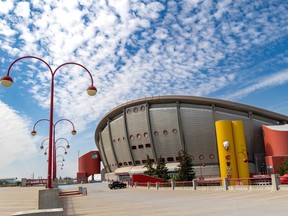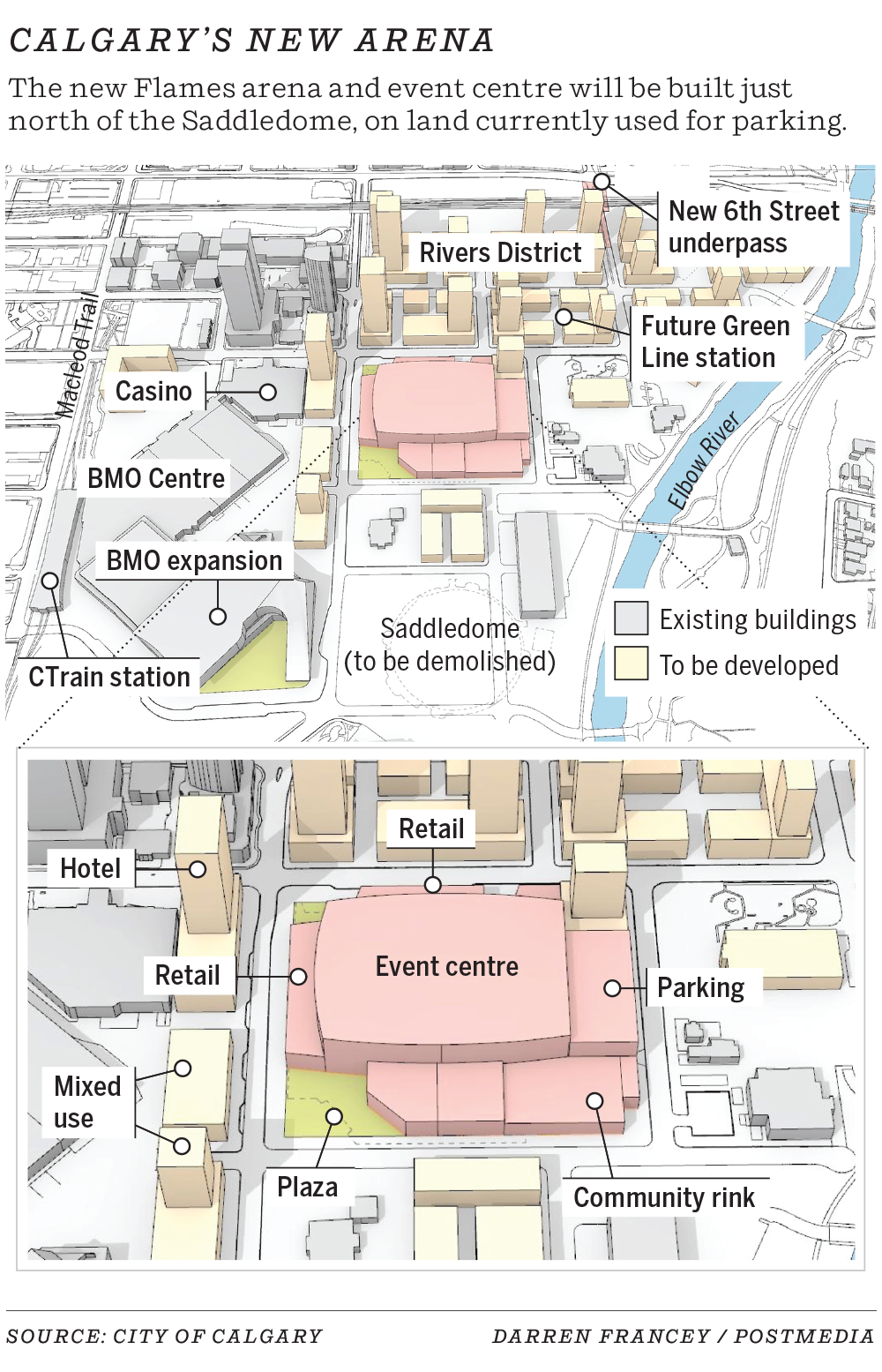
You can save this article by registering for free here. Or sign-in if you have an account.

A definitive agreement for Calgary’s $1.22-billion arena deal is expected to be finalized this summer, as parties continue to negotiate terms of the project.
We apologize, but this video has failed to load. Try refreshing your browser, orThe top-level terms of the deal aren’t expected to change, with the city fronting $537.3 million of the bill, Calgary Flames ownership covering $356 million and the province putting forward $330 million — most of which is directed to surrounding land and infrastructure costs.
Advertisement 2 Story continues below This advertisement has not loaded yet, but your article continues below. THIS CONTENT IS RESERVED FOR SUBSCRIBERS ONLYSubscribe now to read the latest news in your city and across Canada.
Create an account or sign in to continue with your reading experience.
If you are a Home delivery print subscriber, unlimited online access is included in your subscription. Activate your Online Access Now
Article contentNew details on cost breakdowns and timelines remain scarce, however, with the city declining to provide more information while negotiations continued at a Monday meeting of council’s Event Centre Committee, the first held since the agreement in principle was announced in late April.
At the time, Coun. Andre Chabot called the arena deal “as reasonable a compromise as we could have hoped for,” saying neither the city nor the Calgary Sports and Entertainment Corp. (CSEC) got everything they wanted.
“There was a lot of back-and-forth negotiations between us and all parties,” Chabot said.
“I can’t get into the details on what we would have preferred and what some of the pushback was, but what I can say is we have a very predictable annual return that would have been volatile under the old agreement.”

Though few new details were unveiled Monday, the update did bring clarity on some aspects of the deal.
Calgary will be on the hook for the vast majority of upfront costs needed to build the arena and surrounding facilities at 14th Avenue and 5th Street S.E.
Noon News RoundupYour weekday lunchtime roundup of curated links, news highlights, analysis and features.
By signing up you consent to receive the above newsletter from Postmedia Network Inc.
Thanks for signing up!A welcome email is on its way. If you don't see it, please check your junk folder.
The next issue of Noon News Roundup will soon be in your inbox.
We encountered an issue signing you up. Please try again
Article content Advertisement 3 Story continues below This advertisement has not loaded yet, but your article continues below. Article contentThe arena itself costs $800 million, while additional construction on that block — a parkade, a community ice rink, and indoor and outside plazas — drive costs to $924.4 million.
Flames ownership will pay $40 million upfront, and will pay the city $17 million annually plus a compounded one per cent over a 35-year lease. The province will fund $55.1 million for the community rink and plaza space.
That leaves the city’s up-front costs at $831.3 million. That will be funded by a combination of the money earmarked for the previous failed arena deal, reserve funds and working capital the city will have access to during the construction period.
Coun. Sonya Sharp said that means the city won’t take on debt or raise taxes to fund the project, and said CSEC’s adjusted payments to the city over the course of the deal are calculated at nearly $750 million.
Any cost overruns will be split 50-50 between the city and CSEC. The city will pay for all “major structural repairs,” while operating costs and maintenance of the arena is CSEC’s responsibility.
City officials also said contingency costs are built into the agreement, but couldn’t say how much was allocated.
Advertisement 4 Story continues below This advertisement has not loaded yet, but your article continues below. Article contentThe CSEC lease is also slated to stipulate that the Flames will remain in Calgary during the 35-year term.
The city would continue operating the building after that lease ends.
Officials confirmed Calgary won’t receive revenue from naming rights for the new arena, or from a ticket surcharge.
The city initially wouldn’t discuss those aspects of the deal when it was first announced, but added those details to its website in the weeks after.
The lack of revenue from naming rights represents a loss for the city when compared to the previous deal. But officials say the Flames’ $17-million annual payment consolidates those revenue streams into consistent cash for the city.
Sharp defended Calgary’s lack of direct revenue streams in the deal.
“The city isn’t in the business of making a profit on any city-owned building. You can look at that within the Green Line, the LRT, libraries,” Sharp said.
“This is a public building. It is owned by the city and we have private investment supporting it.”
Calgary will sell four commercial parcels of land around the arena at market value, and will receive property tax from those developments. CSEC has first right of refusal on those parcels.
Advertisement 5 Story continues below This advertisement has not loaded yet, but your article continues below. Article contentSharp said a timeline on construction and completion of the project is expected after definitive agreements are signed and the province approves its $330-million contribution, $300 million of which is earmarked for infrastructure costs, including the demolition of the Saddledome.
The province’s treasury board must approve that spending by August, though it’s unclear when they may meet to do so. Premier Danielle Smith has yet to appoint a provincial cabinet after leading her UCP to re-election last week.
One step will be taken Monday, when the city says it will post a request for proposal for a development manager for the event centre and neighbouring facilities.
Recommended from Editorial Breaking down the $1.22B Calgary arena deal Calgary city councillors share reasons for approving arena deal How the new Calgary arena deal came to be Calgary, province, Flames ownership ink $1.22B deal for new arena Flames owners get options on commercial parcels in dealCalgary Chamber of Commerce president Deborah Yedlin, who sits as a public member on the event centre committee, praised the deal as foundational for the city, saying it would activate tax revenue.
Advertisement 6 Story continues below This advertisement has not loaded yet, but your article continues below. Article content“If we want to really rebalance the tax base in the city, this is actually one way to do it,” she said.
City infrastructure services general manager Michael Thompson told council the deal is about more than just the arena, pointing to ongoing and potential developments across the Rivers District and Stampede Park.
“We expect to see and we’re hoping to see additional hotels coming into the area,” Thompson said, who also pointed to retail and restaurants fronting the streets surrounding the arena.
Some critics of the deal continue to question its value, however.
The Calgary and District Labour Council called the deal “substantially inferior” to the previous one, and argued the city’s funds should have been directed elsewhere.
“Tomorrow, city council will be talking about an affordable housing strategy, and the money from this arena could have been better used toward funding affordable housing,” said Alexander Shevalier, president of the local labour group.